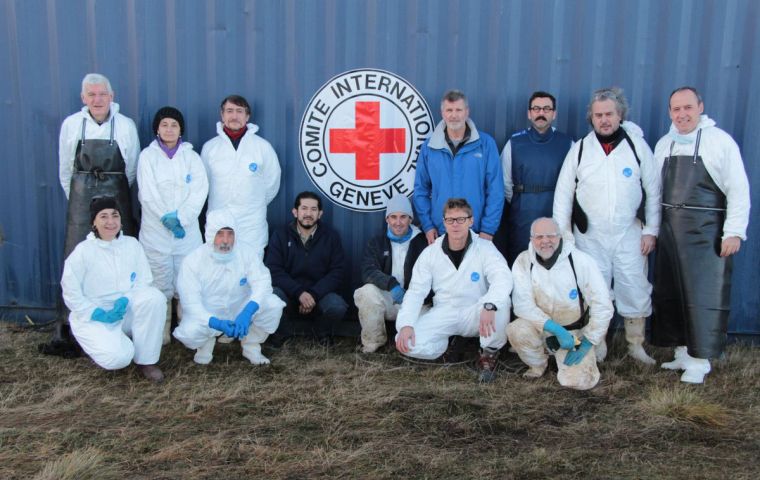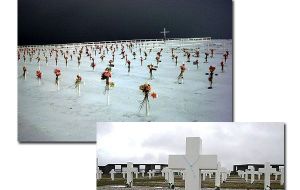MercoPress. South Atlantic News Agency
Falkland/Malvinas Islands: Forensic field work to identify remains of Argentine soldiers comes to an end
 Team of 14 specialists – from Argentina, Australia, Chile, Mexico, Spain and the United Kingdom – exhumed, analysed, sampled and documented the remains of each of the unidentified soldiers.
Team of 14 specialists – from Argentina, Australia, Chile, Mexico, Spain and the United Kingdom – exhumed, analysed, sampled and documented the remains of each of the unidentified soldiers.  ICRC's forensic project coordinator, Morris Tidball-Binz
ICRC's forensic project coordinator, Morris Tidball-Binz  The identification reports will be finalized by the end of the year and submitted to both governments.
The identification reports will be finalized by the end of the year and submitted to both governments. During seven weeks of intense work, which began on 20 June, a team of 14 specialists – from Argentina, Australia, Chile, Mexico, Spain and the United Kingdom – exhumed, analysed, sampled and documented the remains of each of the unidentified soldiers. The work was carried out in a high-tech temporary mortuary built on-site for the purposes of the operation.
After careful analysis, each body was placed in a new coffin and reburied on the same day in the original grave. In the coming weeks the cemetery will be restored to its original state.
”I am pleased to say that we have successfully completed the crucial stage of exhuming, analysing, documenting and reburying each of the soldiers in a grave bearing the inscription Soldado argentino solo conocido por Dios (Argentine soldier known only unto God),“ said the ICRC's forensic project coordinator, Morris Tidball-Binz. ”We have striven to work to the highest scientific and technical standards, despite the logistical challenges involved. The team's wealth of experience in this kind of operation and the strength of their humanitarian commitment was what made it possible.“
”We have treated the remains with the greatest respect and we hope, through our efforts, to give the dead back their identities and thereby bring answers to their families, who have spent more than three decades waiting for their loved ones' remains to be identified,” added Mr Tidball‑Binz.
The second and final batch of samples for genetic analysis will be delivered shortly to the laboratory of the Argentine Forensic Anthropology Team (Equipo Argentino de Antropología Forense, EAAF) in Córdoba. The samples taken from the families for cross-referencing purposes are also held there. Two other laboratories, one in the United Kingdom and one in Spain, will carry out quality control on the DNA analyses.
The identification reports will be finalized by the end of the year and submitted to both governments. The Argentine authorities will contact the families who have requested the identification directly and confidentially to inform them of the results.
In December 2016, the governments of Argentina and the United Kingdom agreed to do their utmost to identify the remains of the soldiers killed in the 1982 conflict, in accordance with their obligation under international humanitarian law to identify those killed on the battlefield. That agreement resulted in the Humanitarian Project Plan, which entrusted the ICRC with the task of identifying the soldiers' remains.
The ICRC carried out this work in accordance with its humanitarian mandate. It is thereby meeting the needs and interests of the families and helping the parties fulfil their obligations, drawing on its vast experience in conflict-related forensic work.
The designations employed in this statement do not imply official endorsement or the expression of any opinion whatsoever on the part of the ICRC concerning the legal status of any territory, or concerning the delimitation of its frontiers or boundaries. Whenever a disputed territory is given different names by the parties concerned, the ICRC uses those names together, in French alphabetical order.




Top Comments
Disclaimer & comment rules-

-

-

Read all commentsMalvinense
Aug 08th, 2017 - 11:23 am +9When is Argentina going to apologise to:-
a) The Falkland Islanders for the death of 3 islanders, damage caused, stress caused, the treating and regard for the Falkland Islanders as untermenschen and the dumping of land mines etc etc.
b) The UK and the individual families for the lives lost, the equipment lost and the financial costs etc. etc.
c) The Argentine families who lost kith and kin
All for this idiotic political stunt which you somehow try to rationalise by making reference to things that may or may not have happened 200 years ago.
Argentina should be ashamed
Aug 08th, 2017 - 04:45 am +8Malvinense 1833 why would god bless an invader.......don't think so......they were not brave at all.........
Aug 08th, 2017 - 10:27 am +8Commenting for this story is now closed.
If you have a Facebook account, become a fan and comment on our Facebook Page!